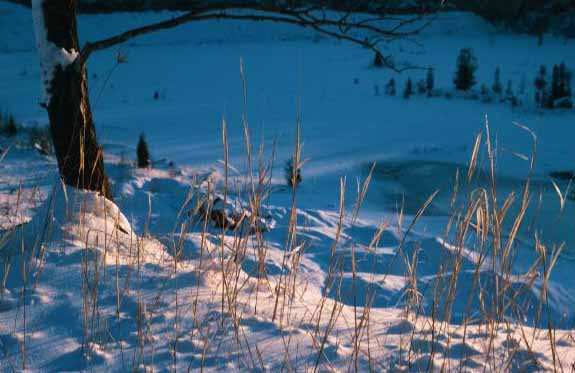
An American Triptych:
Concord, MA
(Walden Pond)

|
An American Triptych: Concord, MA |
for Henry David Thoreau
In America stands a house,
simple, rough hewn, like
a song which speaks eloquently
of important
things
with
words
from everyday life.
Just one room, it is made of wood,
with high glass windows on either
side, a place where the movement of
light could be studied
and known well.
"A melody, as it were,
imported into the wilderness."
A door,
a bed,
a table,
a cooking stove of
black cast iron, a hearth made of stones.
And there's a wooden traverso
lying on the bed. (Did he play?
What kind of sound would
a flute make in such a house?
Would he play
with the door open?)
"A a distance over the woods the sound
acquires a certain vibratory hum as if the pine
needles in the horizon were the strings of a harp
that it swept . . .
Clearly, this is a house in which
one must play
alone, sit and watch
the winter fire and the spring
ice crack, break up and begin to
flow. This is a house
where the necessary has been
patiently
mined from
the superfluous
like a rock that comes out of the
earth whole, not in need of any polish.
His life was this work.
The rock, the word, the life were all
one,
indivisible,
and that is so rare.
"A vibration of the universal lyre,"
This is what you've lost,
America...
"...just as the intervening atmosphere
makes a distant ridge of earth,
interesting to the eyes by the azure
tint it imparts."
The rocket's red glare
has entered your heart's
house and burst
it apart.
"...tint it imparts."
What remains
is a
shoddy shack.
Torn away from the
shores
which gave
so much life,
a derelict now on display.
You have gouged holes
in the Earth at the edge of his song.
Do you still remember the words?
Something
about....?
Yes...
In Concord is no
harmony, America, don't
you hear? No future.
Grave proof through this night
that our heart is not there?
(It might be of help to know that
this poem was written in Europe after a visit
to the historical Walden Pond. Within earshot of the place
where Thoreau spent two of the most important years of his life
and wrote the book of the same name -- his gift to the world --
there is now an immense landfill bordered by a 4-lane expressway.
A replica of the famous little hut he built at Walden Pond is on display
in the middle of the park's parking lot.
The fragments aligned right are taken
from the introduction of Charles Ives' composition
for voice and piano, Thoreau. If there might be
a single piece of music that reflects
both the greatness of North American
culture and the vast continent out of which it emerged, this
virtually unknown song by Ives, itself taken from his Concord
Sonata,
is the one I would without hesitation select.
These texts from Thoreau and Ives should
best be heard inwardly as part of the background
of the composition, but
not performed.)